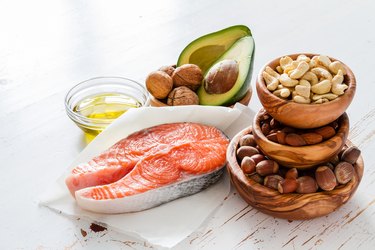
Albumin, a blood protein, is routinely measured to assess overall health status. Albumin has also been commonly used to determine nutritional health, but the interpretation of albumin levels -- and how to manage low levels -- has changed in recent years. Often, when albumin levels are low, an increase in dietary protein is recommended. However, low albumin levels are actually more suggestive of an underlying disease or condition, such as kidney disease, inflammation or malnutrition. While treating the underlying condition is the best way to improve albumin levels, increasing the overall quality of the diet may help increase albumin levels in those who are malnourished.
What Low Albumin Means
Video of the Day
Historically, low levels of albumin were blamed on a poor diet -- most notably a protein deficiency -- but interpretation of this test has changed in recent years. Research published in the April 2014 "Journal of Medical Investigation" indicated that in people receiving treatment for severe burns, albumin was not correlated with diet intake but was related to inflammation. An October 2006 review published in "Practical Gastroenterology" noted that even in severe cases of malnutrition, albumin levels may stay within a normal range. According to an August 2004 article published in the "Journal of the American Dietetic Association," researchers concluded that albumin was not a direct indicator of nutritional health, but rather a marker of the influence of illness on albumin. For instance, inflammation -- present in many diseases -- causes protein to break down in the body, leading to a decreased albumin.
Video of the Day
How Diet Impacts Albumin Levels
Malnutrition, a cause of low albumin levels, can be related to a variety of conditions that decrease appetite -- causing poor food intake and weight loss. When low albumin is connected to malnutrition, increasing calorie and protein intake is often a recommended treatment. Some limited data supports this advice. A small study of people receiving dialysis for kidney failure concluded albumin improved after increasing calorie and protein intake, according to a report in the March-April 2005 issue of "Peritoneal Dialysis International." Another small study published in the July 2004 "Journal of Renal Nutrition" showed that albumin levels improved in study subjects who received intensive counseling on improving nutritional intake. However, an article in the January 2010 issue of "Journal of the American Society of Nephrology" reviewed 8 studies on people with kidney disease and low albumin levels and concluded that increasing calories or protein is not consistently linked to better albumin levels.
Increasing Albumin Levels
If a disease state has caused poor nutrition and resultant low albumin levels, efforts to increase calorie and protein intake with nutritious foods can improve health. Because inflammation is associated with low albumin levels, eating an antiinflammatory diet may be of benefit, although more research is needed to link this to better albumin levels. Eating a variety of colorful fruits and vegetables each day along with whole grains, beans, nuts and seeds is a strategy to lower inflammation. According to the "Journal of the American College of Cardiology," including omega-3 fatty acids in the form of fish, walnuts or soy also reduces inflammation.
Warnings and Precautions
A low albumin level indicates something is wrong with the body, so speak with your doctor for evaluation and treatment. Many conditions can cause albumin to drop, such as liver disease, inflammation, alcohol abuse, medications and overhydration, so work with your doctor on improving or managing the underlying reason for this low test result. If low albumin is due to malnutrition, increasing calories and protein in the diet can be helpful. A registered dietitian can also provide nutrition therapy to guide you in making changes to ensure your diet is optimized for your health needs and that all nutrient needs are being met.
Reviewed by: Kay Peck, MPH, RD
- Journal of Medical Investigation: Serum Albumin Levels Correlate With Inflammation Rather Than Nutrition Supply in Burns Patients: A Retrospective Study
- Journal of the American Dietetic Association: Hepatic Proteins and Nutrition Assessment
- Practical Gastroenterology: Serum Proteins as Markers of Nutrition: What Are We Treating?
- Journal of the American Society of Nephrology: Reassessment of Albumin as a Nutritional Marker in Kidney Disease
- Journal of the American College of Cardiology: The Effects of Diet on Inflammation
- Peritoneal Dialysis International: Randomized, Open Label, Controlled Clinical Trial of Oral Administration of an Egg Albumin-Based Protein Supplement to Patients on Continuous Ambulatory Peritoneal Dialysis
- Journal of Renal Nutrition: Nutrition Counseling Impacts Serum Albumin Levels.
- Academy of Nutrition and Dietetics: Inflammation and Diet
Is this an emergency? If you are experiencing serious medical symptoms, please see the National Library of Medicine’s list of signs you need emergency medical attention or call 911.